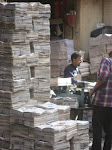Your classmate Amanda found an interesting source of information which resulted in a Fountain Day story different from and more detailed than others in the class. I asked her to blog about it so we could share the information with you:
When I was given the assignment to write an article about some aspect of the University at Albany’s Fountain Day, I knew exactly what I wanted to write about; the history of Fountain Day. In the past, many alumni have told me that the most infamous of the Fountain Days occurred in 2004. Fountain Day 2004 was characterized by mischief and mayhem, giving the university a terrible reputation as well as driving it to the top of Princeton Review’s list of top party schools in the nation. Thus, I decided that for my news story, I would focus on the problems of Fountain Day 2004 as well as the changes that occurred as a result to Fountain Day 2005.
Where to start? I began my research online. I looked at articles featured on the university website, articles published in the Times Union, and any other piece of information that I was able to dig up on Google. I became frustrated when I realized that my classmates were also writing about Fountain Day and were conducting their research the same way I was. If I continued doing the research the way I had been, my story would have been virtually identical to the stories that my peers were writing.
Then I remembered that my boyfriend had once told me about a university historian. When I asked him about it, he said that he used the historian four years ago, when he was a freshman, writing a research paper about the history of Greek Life at the SUNY Albany. He told me that the historian was located on the third floor of the Science Library.
The next day, I found myself wandering around the third floor of the science library. I came across a room and entered. I soon learned that the university historian was on a “sabbatical.” However, I was going to be able to dig through the university archives with the help of a woman who works in the archives office.
I put my backpack in a locker and entered the completely silent room. The woman and I decided that the best place to look for information about the history of Fountain Day was in old issues of the Albany Student Press, or the “ASP.” Since my previous research showed that Fountain Day was originated in 1978 by two students, I looked in the 1978 April and May issues of the ASP and came up with nothing. I proceeded to look in the 1979 April and May issues of the ASP, and once again, came up with nothing. I continued this process until I reached an article about Fountain Day in the 1982 April ASP. Since my story was to focus on Fountain Days 2004 and 2005, I pulled out the Fountain Day articles in the 2004 and 2005 ASPS. TO gain a better understanding of Fountain Day, I also looked at the Fountain Day articles featured in the 2003, 2006, and 2007 issues of the ASPS. Needless to say, I left with more information than I thought I would. I was especially happy because I uncovered a lot of information that could not be found doing a Google search.
I think that the university historian and archives is a gem. While it is hidden on the top floor of the science library, and quite frankly, is difficult to locate, it is a very helpful place to find information about the history of the university.
 Lucy Dalglish, executive director, Reporters Committee for Freedom of the Press
Lucy Dalglish, executive director, Reporters Committee for Freedom of the Press

























